Annabel Monaghan's Blog, page 6
February 9, 2016
When It Comes to Neighbors, Be Lucky
As published in The Rye Record on February 5, 2016
 When I was a new mom, we lived in an apartment on 57th Street across the hall from an elderly man who smelled like soup. I remember him because of the soup, and also because of the wisdom he passed along to me on the day I moved in. He told me that in life there are two things that you cannot control that directly influence your happiness: coaches and neighbors. You can’t pick either, so his advice to me was to be lucky.
When I was a new mom, we lived in an apartment on 57th Street across the hall from an elderly man who smelled like soup. I remember him because of the soup, and also because of the wisdom he passed along to me on the day I moved in. He told me that in life there are two things that you cannot control that directly influence your happiness: coaches and neighbors. You can’t pick either, so his advice to me was to be lucky.
I took that advice to heart. When I left the soupy building, I moved across the hall from a woman who was exactly my age and had a baby who was born the day before mine. We drank cheap wine in the evenings while we bathed our kids. It was a play date that lasted for two years and made all the difference to my happiness during that time.
Neighbors are different from friends. Friends are people that you arrange to meet, at mutually agreed upon places, where you will presumably be prepared to socialize. Friends are generally people with whom you have things in common. And friends are people you choose. Neighbors are more like family. You interact with them because fate put you together. Your relationship revolves around your shared space and grows in the familiarity of your routines. Most interactions with neighbors happen, unplanned, in someone’s driveway.
As with your relatives, you cannot break up with your neighbors. When the dust settles, they are still there right across the yard. And they know what’s in your recycling.
I reflect on neighbors now in particular because there are three empty houses on my street. It’s exciting to imagine what luck will bring this time, but I have to admit it’s a little too quiet. I miss the little kid who used to come over and play basketball with my son until they were both drenched in sweat. I miss waving to the family on the corner as we all, inefficiently, drove the exact same route to school. Most of all, I miss the man who used to walk his dog (and his cat!) in the morning with his nose in the New York Times. These things are hard to replace.
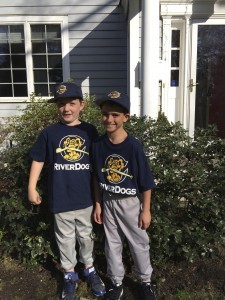 When a neighbor starts to feel like a brother
When a neighbor starts to feel like a brotherMy greatest hope is that my new neighbors will be borrowers, the kind that appear on your doorstep with a quarter cup measure in search of sugar. One of my favorite neighbors was a major borrower, and we became fast friends. She used to knock on my kitchen window and ask, “Can I borrow some coffee beans?” And then she’d come back 10 minutes later, “Can I borrow your coffee maker?” We’d laugh and laugh. How could you not adore such a person?
A borrower is willing to admit that they don’t always plan ahead, that they don’t exactly have it all together. Borrowers are imperfect people who are able to make themselves a little bit vulnerable to you in front of your stocked fridge. The act of borrowing shows that you don’t think a couple of eggs are a big deal, and that you’re going to be okay with any future vulnerabilities on the part of the lender. Borrowers just might be the most generous people of all.
 These two, hosts of the card table party
These two, hosts of the card table partyI moved out of my last house eight years ago, equal parts excited to have working toilets and sad to leave my wonderful neighbors. The night before we moved, they invited us for champagne at a card table in their driveway. It was funny to be sitting in the driveway, but it was also fitting, as driveways are where so much neighboring happens – the shared basketball hoop, the mis-delivered package, the spontaneous heart to heart, the tears you didn’t know you needed to shed. We toasted to our best driveway memories – the day I almost ran over their daughter because I was too pregnant to turn around, the week my baby and I spent on the curb watching their house get painted, the morning we found a baby bat who’d fallen out of its nest.
I have had the best possible run of neighbors, and I hope my luck holds up. My preference is for families with lots of little boys, an aggressive holiday decorating style and an inadequately stocked pantry. But I’ll take whatever I get.
The post When It Comes to Neighbors, Be Lucky appeared first on Annabel Monaghan.
January 29, 2016
Greatest Mother in the World Spotted in YMCA Parking Lot
As published in the Rye Record on January 22, 2016
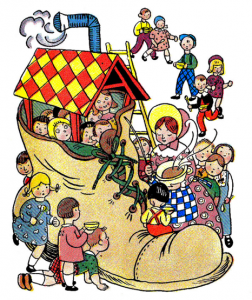 I saw a woman leaving the YMCA yesterday with a baby strapped to her chest, another, slightly larger one in a stroller, and a three year old holding her hand. She was infested with small children. I stopped to watch. How in the world are they going to make it to their car, I wondered. How is she going to cross the great abyss between where she is right now and bedtime?
I saw a woman leaving the YMCA yesterday with a baby strapped to her chest, another, slightly larger one in a stroller, and a three year old holding her hand. She was infested with small children. I stopped to watch. How in the world are they going to make it to their car, I wondered. How is she going to cross the great abyss between where she is right now and bedtime?
When they got close enough, I could hear that the three year old was trying to make a scene. I say “trying to make a scene,” because he was waging war against his mother, and she was refusing to participate. With a steady gait and an even expression, she ignored him. It was the most spectacular moment in parenting I have ever seen. This woman, who I imagine lives in a shoe, should teach a seminar.
It seemed that I had walked in on the one-sided battle late. The three year old was saying, “You’re so mean to me” over and over again. I tried to think back to all of the things I would have said in this situation when I had toddlers to defend myself against. “I’m mean??” I would have started. “You’re the one who…” But she said nothing, and without a reaction from his mother, this kid was firing blanks.
He tried a new approach. “I’m freezing. I don’t even have any pockets.” To which his mother responded, “Oh, that’s too bad. You should have brought a jacket with pockets.” There was not a hint of sarcasm in her voice. She said this in the tone you would use to say, “I think I’m going to wear my blue sweater today.” The cold weather was not going to turn into an emotionally charged subject either.
There before me was a new existential question of parenting: If a child has a fit in the parking lot and his mother doesn’t react, did he really have a fit at all?
Pound for pound, a small child has more power in a public place than an adult. Small children have the advantage over the rest of us in that they are loud and they are not self-conscious. It’s a lethal combination. A temper tantrum at home can be tuned out. A temper tantrum on a full flight cannot.
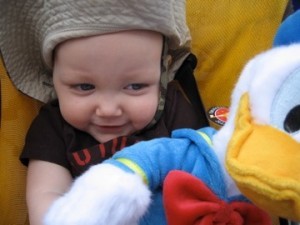 Cute, right? Not on an airplane
Cute, right? Not on an airplaneFor this reason, I bow my head out of respect when I encounter a two year old on an airplane. No one outside the cockpit has more control over how this flight’s going to go than this pretty little creature with the Hello Kitty backpack. I smile at her panicked parents in solidarity. They try not to make eye contact, embarrassed because we are about to find out what a beast their child is. I pray that they’re armed with markers, snacks and Benadryl.
The child hurling himself on the floor of the cereal aisle is exposing our worst insecurities to the eyes of strangers. Those eyes might actually be sympathetic or amused, but in them we only see confirmation of the truth we’ve suspected all along: We’re pretty much doing everything wrong. It was downright reckless of them to let us leave the hospital with a baby. Chances are we’ve ruined him already, so we might as well just give him the Froot Loops.
The key to our parking lot heroine’s success is that she was decidedly not self-conscious. She was aware that I had stopped in my tracks to watch this scene, riveted. But in the same way she wasn’t going to hand her power over to her three year old, she wasn’t going to hand it over to me either. If could go back in time and give my young-mother self one quality, it would be that ability to hold on to my power.
As they got in the car, the child threatened, “When we get home I’m going to my room!” His mother replied, “I think that’s a wonderful idea.” Checkmate.
 A hundred years ago, in need of a nap
A hundred years ago, in need of a napThe post Greatest Mother in the World Spotted in YMCA Parking Lot appeared first on Annabel Monaghan.
December 18, 2015
Lost and Found and Down the Rabbit Hole
 It usually starts with “Mooooom…” Though it sometimes starts with “Hooooooney…” I hear it more in my lower back than in my ears, because I know this calm plea for help often leads to a trip down the rabbit hole. It’s the moment that some member of my family cannot immediately find the item that he’s looking for. He’s looked in the one spot he thought it would be and didn’t see it. We are moments away from pure madness.
It usually starts with “Mooooom…” Though it sometimes starts with “Hooooooney…” I hear it more in my lower back than in my ears, because I know this calm plea for help often leads to a trip down the rabbit hole. It’s the moment that some member of my family cannot immediately find the item that he’s looking for. He’s looked in the one spot he thought it would be and didn’t see it. We are moments away from pure madness.
This doesn’t happen with easily replaceable things, like the glass of water he was just drinking or a pair of white socks. It’s the uniform for the game that’s starting in an hour or the keys to the only car that has gas in it. The item is critical, the stakes are high, and the clock is ticking.
I stay very calm. At first. I go back to the place where it was supposed to be and re-look, mainly because this is not my first rodeo. I look under things. I sometimes wonder if my kids missed that peek-a-boo phase of development where you learn the concept of permanence. Just because your phone’s under a baseball hat doesn’t mean it’s not there.
Once I’ve exhausted the two most likely places the item might be, we collectively start to panic. I try not to get sucked in, but panic truly is contagious. And when this happens, a fog falls over all of us and we become visually impaired. We have opened our eyes to the fact that this thing could be gone forever, and from then on we cannot see anything but the absence of the object. We walk in and out of rooms, not really seeing anything. We paw through the laundry basket. It’s just not there. We look again.
The fog leads to the flashbacks, and that’s when the door to the rabbit hole opens. We descend single file. The owner of the lost item speculates that he had the item with him last week and thinks he remembers putting it down on the bleachers. But he thinks he had it again at Will’s house on Friday. Or maybe it was in his backpack at that scrimmage, which he remembers leaving open and unattended for an hour.
Obviously, it’s been stolen. This is a favorite theory in my family. With all the things in my house that have disappeared via theft, it’s weird that all my jewelry’s still here. And the TVs. It’s just muddy cleats and a favorite pair of blue exercise shorts that they’re after. Criminals are a mysterious breed.
Now that we are all the way down the rabbit hole, we are no longer looking in the house. I am on the phone with neighboring school districts asking them to check their Lost and Founds. Sure, I’ll hold. Someone drives to the field to check the bleachers. We’ve left three voicemails for Will’s mom. We are a frenzy of motion and loud voices and circular arguments. We stop short of calling the police.
The last time this happened (Tuesday), it got so bad that my survival skills kicked in. I had the presence of mind to try to make my way back to the surface. I said to the supremely panicked person, “I will find this, but I need to get your energy out of this house.” Oddly, he knew exactly what I meant. See, this wasn’t his first rodeo either. He was out of the house for 5 minutes before I regained my sight and 10 minutes before I found that thing. It was in the laundry basket that we’d been through three times.
The post Lost and Found and Down the Rabbit Hole appeared first on Annabel Monaghan.
December 7, 2015
Holiday Traditions That Last
As published in The Rye Record on December 4, 2015
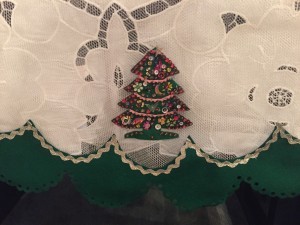 Decades ago, my Nana made a Christmas tablecloth that is still used by my family every year. It is hand-beaded with a delicate mesh overlay. Green felt trees are sewn around the skirt, each decorated with the name of a family member. As a child, I would see this tablecloth on Christmas night, find my little tree, and feel like I was a part of something, as if I was permanently embroidered into this tribe. As an adult I am struck with a different kind of wonder: how is this thing still in one piece? Where’s the tell-tale red wine stain? Where are the moth holes?
Decades ago, my Nana made a Christmas tablecloth that is still used by my family every year. It is hand-beaded with a delicate mesh overlay. Green felt trees are sewn around the skirt, each decorated with the name of a family member. As a child, I would see this tablecloth on Christmas night, find my little tree, and feel like I was a part of something, as if I was permanently embroidered into this tribe. As an adult I am struck with a different kind of wonder: how is this thing still in one piece? Where’s the tell-tale red wine stain? Where are the moth holes?
My grandmother’s life was characterized by permanence. Not just because she lived to be 100 years old – it doesn’t get much more permanent than that – but also because of the care she took with everything she did and everything she had. It’s a joke in my family that things that are handed down from generation to generation arrive at my house only to be completely destroyed in a matter of weeks.
One year she gave me a cake server with a porcelain handle for my birthday. On that very day I placed it too roughly on my kitchen counter and it shattered. My guess is that Nana never placed anything roughly on the counter. Since that day, I have tried to approach all of her things with special care. I try to use her careful hands, her pace.
Nana took no shortcuts. Tea was worth making by the pot, with loose leaves. It was served in a matching teacup, even if it was just tea for one. Nana was all about hand washing and cool ironing. If she put up a hem, you could be sure it would last longer than the pants to which it was attached.
This quality of hers always strikes me during the holidays, especially as I am frantically purchasing items that I know my kids will enjoy for between one and seven days before losing or breaking. Before Christmas I purge giant bags of stuff to make room for more stuff that I will likely purge in a year. I do not remember this cycle of frantic acquiring and disposing in my grandparents’ generation. They seemed to buy a few well-chosen things that were meant to last forever.
 Still, I try to find one or two gifts that will endure. Nana used to give each of us an ornament for Christmas. It was either carefully selected or handmade, and she’d embroider the year on the back. There was a little understanding in that stitched date that this was something to be kept and treasured. Each ornament holds in it the spirit of its particular Christmas. I can’t seem to find my college diploma, but the little pink angel from 1979 is always right where I left it.
Still, I try to find one or two gifts that will endure. Nana used to give each of us an ornament for Christmas. It was either carefully selected or handmade, and she’d embroider the year on the back. There was a little understanding in that stitched date that this was something to be kept and treasured. Each ornament holds in it the spirit of its particular Christmas. I can’t seem to find my college diploma, but the little pink angel from 1979 is always right where I left it.
Today my husband and my children’s names are on the Christmas tablecloth. Thankfully, my aunt (and not me) has inherited the responsibility of caring for it. The trees with my grandparents’ names, the originals, are at either end of the table, and there is plenty of room along the edges for future generations.
The post Holiday Traditions That Last appeared first on Annabel Monaghan.
November 23, 2015
They’re not Thoughtless. They’re Astronauts.
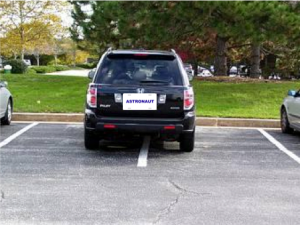 Astronauts need space.
Astronauts need space.It’s funny when your kids start driving and noticing how frequently the adults around them don’t obey the traffic laws. Look, Mom, that guy didn’t signal. Look, Mom, that lady ran the stop sign. Again, I need to fill them in. I explain to my kids that it’s because these people are just a bunch of astronauts (pronounced ass-tro-nauts). Or at least I assume they’re astronauts, because our earthly laws don’t seem to interest them. It’s our job to look the other way as they zoom through life at warp speed, double-parking if they have to stop for Tang.
Astronauts are highly trained people, with billions of dollars of research and equipment riding on their full concentration and success. Do you think they really have the extra mental energy to signal to the driver behind them that they plan to turn left? Of course not, they’re headed to infinity and beyond! And if that happens to involve a left-hand turn then the civilians behind them can enjoy the surprise.
When the space shuttle is scheduled to go, it’s scheduled to go. NASA’s not going to wait just because its lead astronaut had to drive 20 mph in a school zone. When you see her zipping by at 8:30am like she’s in a high-speed chase, just remember what’s really at stake. Same goes for the guy who’s roaring past you on the shoulder of the highway. It’s a little known fact that the highway shoulder was the brainchild of the space program. You can’t expect someone who moves through space at 17,500 mph to sit in traffic.
Ditto for idling. The extra time it takes to turn off the ignition and then back on again could unravel a carefully prepared mission. Not to mention the indignity of being slightly too hot or slightly too cold. (Though you’d think the spacesuit would adjust for that. Hmm.)
 Speaking of that cumbersome spacesuit, when I happen upon a car parked in not one, but two parking spots, I laugh to myself, “Ah! We have an astronaut in our midst.” A person in a huge spacesuit and helmet cannot be expected to squeeze out of her car with another one crammed right next to her. She pulls in right down the dividing line so she doesn’t smudge her nice white suit on your dirty Suburban. If astronauts need anything, it’s space.
Speaking of that cumbersome spacesuit, when I happen upon a car parked in not one, but two parking spots, I laugh to myself, “Ah! We have an astronaut in our midst.” A person in a huge spacesuit and helmet cannot be expected to squeeze out of her car with another one crammed right next to her. She pulls in right down the dividing line so she doesn’t smudge her nice white suit on your dirty Suburban. If astronauts need anything, it’s space.
In a pinch, astronauts will ride the train. They show up around rush hour and we need to be mindful of the precious cargo they cart around. Those might look like normal handbags and briefcases taking up the coveted seat next to them, but they likely contain moon rocks or Martian mud or the keys to the space station. You can’t expect somebody to just put that stuff in his lap. I want to remind the tired commuters that the sacrifice that they are making in standing up all the way home is in the name of science. It may feel like a small cramp in your left leg, but really it’s a giant leap for mankind.
Also critical to the astronauts is communication. They need to be in constant contact with ground control, so if they are first in line at a traffic light and that light turns green, just be cool about it. When that text goes through and they’re good and ready, you’ll be on your way.
I hope I’ve helped to clear things up. Next time you see someone behaving this way, don’t take it personally. Be grateful for their hard work and wish them Godspeed.
The post They’re not Thoughtless. They’re Astronauts. appeared first on Annabel Monaghan.
October 23, 2015
The Time Warp of Back to School Night
As publishished in The Week on October 21, 2015
 The cool kids are hanging by the lockers, laughing and talking a little too loud. The nerds are in the classroom early, eager to shake hands with the teacher and nab the seats in the front row. The girls are put together in skinny jeans, heels, and blown-out hair. You know what I’m talking about, right? This is back-to-school night, and these are the parents of actual high schoolers.
The cool kids are hanging by the lockers, laughing and talking a little too loud. The nerds are in the classroom early, eager to shake hands with the teacher and nab the seats in the front row. The girls are put together in skinny jeans, heels, and blown-out hair. You know what I’m talking about, right? This is back-to-school night, and these are the parents of actual high schoolers.
Back-to-school night for high school is dramatically different than it is at elementary school. When you go to the little kids’ school you are acutely aware of your status as an adult. You sit in teeny tiny chairs and look through the “artwork” that your child has left for you. The teacher talks about how he’s going to teach your kid to do stuff that you already know how to do. It’s adorable how they’re growing up, isn’t it?
In contrast, back-to-school night at your kid’s high school makes you feel like a kid. I wander from class to class with no clue as to where I’m going. The traffic in the halls is so socially overwhelming that I find myself saying hello to everyone like I’m running for Student Council president. Skinny Jeans walks by me and flips her hair without saying hello. I wonder what that means. Did I say the wrong thing? Did I say the right thing but to the wrong person and it got back to her?
I am in a time warp and I’ve brought everyone with me. That guy who’s texting in class, he was a note passer. That girl who’s writing down every word the teacher says (even the jokes), she’s going to be valedictorian. The jock in the back row is stretching because he had a really hard practice today. And look, he’s married to a cheerleader.
And just like in like high school, half the time I have no clue what the teachers are talking about. I walk into Biology and the teacher has an assignment for us on the board. “Record your inferences about these photos.” Look, lady, I didn’t come here to do homework. You can’t make me.One photo looks like a bunch of colors and the other looks like a feather. I write that down, grudgingly. She starts her presentation by telling us the answer. I wasn’t even close. I swear, just like high school.
When it’s time for break I hit the cafeteria and am relieved to find my BFF. She seems relieved to find me too, and we move to a safe corner. It’s loud and crowded and the popular girls are selling things behind a folding table, somehow already in a club. Skinny Jeans is there and looks sublimely happy. I have a feeling she feels like she’s back in high school, too.
I am happy when the bell rings and I can go to English. This woman speaks my language. I telegraph to her from my seat in the very front of the class (I guess that settles it, I’m a nerd) how much I love her and every book she’s teaching and how much I want to be her when I grow up. Even though she’s 30. I leave without saying hello, however, because I don’t trust myself to be cool about it.
 I go to more classes, each eight minutes long. Calculus, as it turns out, has very few numbers and is too complicated for the teacher to explain to us. I’m a little grateful. The bell rings again and we check our schedules to figure out where our next class is. I have gym, so I instinctively run through my handy list of female problems that disarm male gym coaches. But then it hits me, I’m a grown up. I can just go home.
I go to more classes, each eight minutes long. Calculus, as it turns out, has very few numbers and is too complicated for the teacher to explain to us. I’m a little grateful. The bell rings again and we check our schedules to figure out where our next class is. I have gym, so I instinctively run through my handy list of female problems that disarm male gym coaches. But then it hits me, I’m a grown up. I can just go home.
The post The Time Warp of Back to School Night appeared first on Annabel Monaghan.
October 12, 2015
Is Anyone Listening? (The Case for Bringing Back How Do You Do)
As published in The Rye Record on October 9, 2015
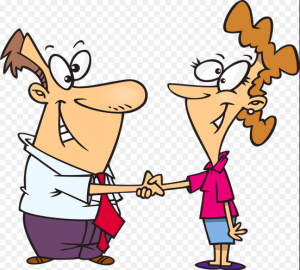 It’s a basic human need to be heard. It’s why we have words and art, so that we can take what’s inside of us and share it with others. Likewise, really hearing what someone is trying to tell you is the most affirming, kindest thing you can do for them. I believe this with all my heart, which is why it’s kind of funny that I’ve completely stopped listening to people.
It’s a basic human need to be heard. It’s why we have words and art, so that we can take what’s inside of us and share it with others. Likewise, really hearing what someone is trying to tell you is the most affirming, kindest thing you can do for them. I believe this with all my heart, which is why it’s kind of funny that I’ve completely stopped listening to people.
Consider this conversation I have every time I check out my groceries. Checker: “Did you find everything you were looking for?” Me: “Fine thanks.” We both notice but politely ignore what I’ve done there. I’m answering a question that I expected her to ask (because God knows everyone cares how I am), and she’s asking a question that that her manager said was going to make me feel like I was getting excellent customer service. And sure, I couldn’t find the hummus I was looking for. There was hummus, but just the weird kind with the roasted peppers on top, the kind that totally freaks my kids out. Is this her problem? Is there any hummus in the world that’s worth making her leave her post while everyone else in line behind me waits? I think not, so I tell her I’m fine thanks.
Listening is on the decline in general. I don’t mean the nose-to-nose, heartfelt listening you do with a friend, the kind where “How are you?” leads to follow up questions and furrowed brows. I mean there’s a decline in listening to the million have-a-nice-days that comprise the white noise around us. The more of it we hear, the less it means and the less we listen.
I’m a big part of the problem. I spend my day assaulting people with the quick “How are you?”, tossed over my shoulder as I leave the room or peel out of the parking lot. It lands like a dead grenade at the feet of whomever I asked. The expected response is either “good” or “fine,” but I’m okay with “You’re welcome,” “No thank you,” or nothing at all. Once I asked a woman how she was, and she said “Fantastic!” That, I heard. Fantastic? She’s obviously having an affair. But I never found out about it, because I’d shouted the question while driving past her at 10 miles per hour.
When the guy at the coffee shop says “How you doing?” he means, “May I help you?” or even “Next!” I ignore his question and say, “May I please have a small coffee?” My response is actually more polite than if I’d taken the time to thank him for his interest and expound on exactly how I’m doing: I’ve been busy with work and my son’s applying to college, a subject on which I have many thoughts and feelings, which I will now list now in order of when these thoughts and feelings hit me during the day… Can you imagine being the person behind me in line who just wants to order a latte?
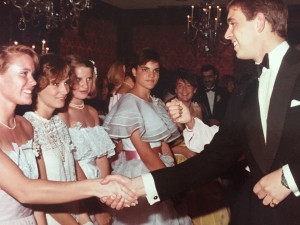 In 1983 I met Prince Andrew. It was the last time I heard “How do you do”
In 1983 I met Prince Andrew. It was the last time I heard “How do you do”In a sense, “How are you?” has become a rhetorical question, which is why I’m in favor of bringing back “How do you do?” It’s a question that acknowledges the fact that it’s just a greeting, a placeholder and nothing more. The response to “How do you do” is “How do you do.” How easy is that? You toss it right back and keep moving. It’s like the modern day “What’s up?”, the response to which seems to also be “What’s up?” Is it possible that “What’s up?” is the new “How do you do”?
In the meantime I’m trying to budget my how-are-yous only for the times when I am in a position to stay and listen to the answer. And, be warned, I’m going to try to start training other people to budget theirs by actually answering exactly the question I was asked. You may not want to get behind me in line at the grocery store.
The post Is Anyone Listening? (The Case for Bringing Back How Do You Do) appeared first on Annabel Monaghan.
Is Anyone Listening? (The Case for Bringing Back “How do you do”)
As published in The Rye Record on October 9, 2015
 It’s a basic human need to be heard. It’s why we have words and art, so that we can take what’s inside of us and share it with others. Likewise, really hearing what someone is trying to tell you is the most affirming, kindest thing you can do for them. I believe this with all my heart, which is why it’s kind of funny that I’ve completely stopped listening to people.
It’s a basic human need to be heard. It’s why we have words and art, so that we can take what’s inside of us and share it with others. Likewise, really hearing what someone is trying to tell you is the most affirming, kindest thing you can do for them. I believe this with all my heart, which is why it’s kind of funny that I’ve completely stopped listening to people.
Consider this conversation I have every time I check out my groceries. Checker: “Did you find everything you were looking for?” Me: “Fine thanks.” We both notice but politely ignore what I’ve done there. I’m answering a question that I expected her to ask (because God knows everyone cares how I am), and she’s asking a question that that her manager said was going to make me feel like I was getting excellent customer service. And sure, I couldn’t find the hummus I was looking for. There was hummus, but just the weird kind with the roasted peppers on top, the kind that totally freaks my kids out. Is this her problem? Is there any hummus in the world that’s worth making her leave her post while everyone else in line behind me waits? I think not, so I tell her I’m fine thanks.
Listening is on the decline in general. I don’t mean the nose-to-nose, heartfelt listening you do with a friend, the kind where “How are you?” leads to follow up questions and furrowed brows. I mean there’s a decline in listening to the million have-a-nice-days that comprise the white noise around us. The more of it we hear, the less it means and the less we listen.
I’m a big part of the problem. I spend my day assaulting people with the quick “How are you?”, tossed over my shoulder as I leave the room or peel out of the parking lot. It lands like a dead grenade at the feet of whomever I asked. The expected response is either “good” or “fine,” but I’m okay with “You’re welcome,” “No thank you,” or nothing at all. Once I asked a woman how she was, and she said “Fantastic!” That, I heard. Fantastic? She’s obviously having an affair. But I never found out about it, because I’d shouted the question while driving past her at 10 miles per hour.
When the guy at the coffee shop says “How you doing?” he means, “May I help you?” or even “Next!” I ignore his question and say, “May I please have a small coffee?” My response is actually more polite than if I’d taken the time to thank him for his interest and expound on exactly how I’m doing: I’ve been busy with work and my son’s applying to college, a subject on which I have many thoughts and feelings, which I will now list now in order of when these thoughts and feelings hit me during the day… Can you imagine being the person behind me in line who just wants to order a latte?
 In 1983 I met Prince Andrew. It was the last time I heard “How do you do”
In 1983 I met Prince Andrew. It was the last time I heard “How do you do”In a sense, “How are you?” has become a rhetorical question, which is why I’m in favor of bringing back “How do you do?” It’s a question that acknowledges the fact that it’s just a greeting, a placeholder and nothing more. The response to “How do you do” is “How do you do.” How easy is that? You toss it right back and keep moving. It’s like the modern day “What’s up?”, the response to which seems to also be “What’s up?” Is it possible that “What’s up?” is the new “How do you do”?
In the meantime I’m trying to budget my how-are-yous only for the times when I am in a position to stay and listen to the answer. And, be warned, I’m going to try to start training other people to budget theirs by actually answering exactly the question I was asked. You may not want to get behind me in line at the grocery store.
The post Is Anyone Listening? (The Case for Bringing Back “How do you do”) appeared first on Annabel Monaghan.
September 29, 2015
If More Moms Were Inventors
As Published in the Rye Record on September 25, 2015
 My son’s third grade class studied inventors last spring. Every day he came home with another fascinating story of an invention like the light bulb or the automobile. It was inspiring to him and to me, because it made us see how people who get really tired of the status quo (candles, walking) can use that frustration to find tangible, life-changing solutions. I cannot think of a group of people who are more frequently frustrated by the status quo than moms.
My son’s third grade class studied inventors last spring. Every day he came home with another fascinating story of an invention like the light bulb or the automobile. It was inspiring to him and to me, because it made us see how people who get really tired of the status quo (candles, walking) can use that frustration to find tangible, life-changing solutions. I cannot think of a group of people who are more frequently frustrated by the status quo than moms.
Things have to get bad enough for people to invent things. It’s that last straw moment, the one where you just wrecked your freshly painted wall with that innocuous Scotch tape, that leads to something like a Post It. Because moms are constantly being handed the last straw, it’s surprising that the world isn’t full of mom inventors.
There are some great things that have already been invented by moms in distress. Take Baby Einstein – an endless loop video that mesmerizes your child with simple images and classical music, all in the name of brain development. I imagine the woman who invented it reaching her boiling point, “I need a break! And I don’t want to hear any grief about my kid spending the day in front of the TV! Wait. What if I convince people it’s making him a genius?” Millions of dollars and a few guilt-free breaks later, I say she’s the genius.
I have some of my own ideas, in case some of you STEM-focused doers want to get on it. First and foremost, a TV with a heat sensor that turns itself off when no one is in the room. If this isn’t invented, the blare of ESPN’s du-du-du from an unwatched TV will someday be my undoing.
 Secondly, moms are busy. How about a time saving pill that targets whatever part of your body dictates hair color and then changes it into the shade of your choice. Tablets would come in the same kind of boxes that hair dye is sold in, with photos of models wearing Sunshine Blonde, Ginger or Raven. This would potentially save a person who dyes her hair 17 hours a year, more time than her kid probably ever watched Baby Einstein.
Secondly, moms are busy. How about a time saving pill that targets whatever part of your body dictates hair color and then changes it into the shade of your choice. Tablets would come in the same kind of boxes that hair dye is sold in, with photos of models wearing Sunshine Blonde, Ginger or Raven. This would potentially save a person who dyes her hair 17 hours a year, more time than her kid probably ever watched Baby Einstein.
Someone should invent socks with very weak magnets in the ankle. The magnets wouldn’t be strong enough to affect walking, but when they are thrown in the laundry they are drawn to each other. Maybe they are heat activated? Also: sock GPS is a must. It would be awesome to go online and be able to track all your socks to their exact location. (As you know, many of you would be tracking your socks to my house. See you soon!) And how about an odor eliminating fabric that would keep the rest of the laundry from being contaminated? Odor-lock Socks ™ Is that already a thing? It should be a thing.
How easy is this?: A package of 8 rolls of paper towels each decorated with sequential numbers. The last roll would be decorated in colorful number 8s, reminding you that you are nearly out of paper towels.
Here’s one I’ve been thinking about for so long that it’s almost been invented: a localized online data base for stuff you want to loan and borrow. Everyone in your neighborhood just signs up and enters what they have to loan, and then they browse through to see what other people have. It would be mostly stuff you need once a year and don’t want to have to pay for or store. I have 40 wine glasses, do you have a chaffing dish? I have six folding chairs, do you have a bouncy castle? I know. It’s brilliant, and it’s yours, seriously, run with it.
The post If More Moms Were Inventors appeared first on Annabel Monaghan.
September 18, 2015
test post 2
As published in The Week on September 4, 2015
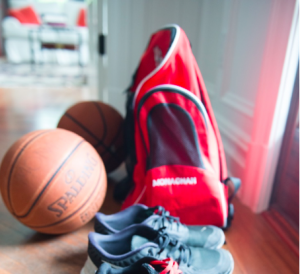 Teenagers fool us with their size, vocabulary, and swift mastery of new devices. They seem to be about the right shape to fit into the adult world. They drive cars. They know algebra. So it’s always momentarily shocking to find out that they don’t know how to address an envelope or operate a can opener.
Teenagers fool us with their size, vocabulary, and swift mastery of new devices. They seem to be about the right shape to fit into the adult world. They drive cars. They know algebra. So it’s always momentarily shocking to find out that they don’t know how to address an envelope or operate a can opener.
My kids are the only people in my house who are as smart as my smart TV. I honestly have to enlist their help every time I want to change the channel. They know how to work Netflix, and they can figure out how to get WiFi anywhere in the world. And yet…
My son recently started a road trip by quickly clicking an address on his phone’s GPS. He then drove to the exact right address in the wrong state. It’s these little things that you’d never think to explain that turn out to be big things. When he was leaving, should I have added “Go to the right state!” to my standard “Make good choices!”?
My teenagers know Pi to 20 decimal places, but they do not understand why keys matter. Their house keys are used and discarded like tissues. I sat dumbfounded as my husband explained to them the etymology of the word “key.” The reason people refer to the most important part as the “key” part is that keys are really important. Seriously, I wondered, does this even need to be said? How could a person with the motor skills to operate a key not know this?
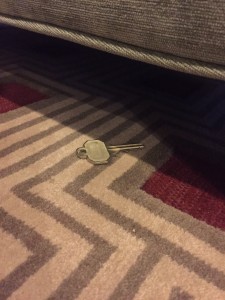 Honestly.
Honestly.They know all the elements on the periodic table. They can name every starting player for every team in the NBA. But they were surprised to learn that chicken, left on the counter overnight, goes bad. At some point, facts like this become a matter of survival.
Of course some of this is just the teenage brain, designed like a sieve and with an incomplete prefrontal cortex. But it’s also just a lack of information. Their defense is simple and consistent: “I didn’t know that was a thing.” That explanation should find its way into a scientific journal.
I didn’t know that was a thing. This phrase echoes in my mind, bringing me back to those hazy, soupy teen years when I could only see a few feet ahead of myself. My parents probably shook their heads a lot, but they didn’t try to spoon feed me facts. No one waved from the bus stop shouting, “Have a good day! Don’t drink water from a still pond! Run in a zig zag if a bear chases you!” Everything I know I learned from cartoons or calamity.
There are a million things I never knew were a thing. When I was 19, I bought a used Volkswagen for $500. At the time I knew a lot about French literature and pretty much everything about William Faulkner. But I didn’t know you needed to put oil in a car. No one had ever told me, so I didn’t know that was a thing.
That same year I backpacked all over Europe with my passport in my back pocket. Now that I think of it, passports could be described as “key.” I didn’t know that was a thing either.
I can work myself into a panic thinking of all the things that my kids probably don’t know. Don’t drink soda and eat pop rocks, or your head will explode. Never put your drink down at a bar. A person who has to say “to be honest” isn’t going to be. If you see the shoreline rise rapidly, run!
This must be why parents just stick to the basics: Look both ways before crossing the street, wash your hands, don’t let the bedbugs bite. The rest of it is going to be filled in along the way, an education provided not by us, but by a series of small catastrophes that they’ll likely survive.
The post test post 2 appeared first on Annabel Monaghan.



